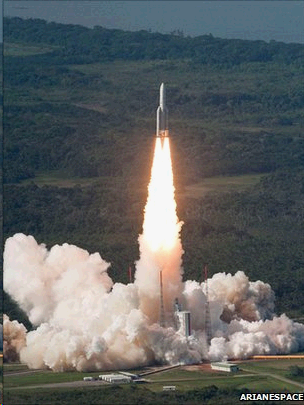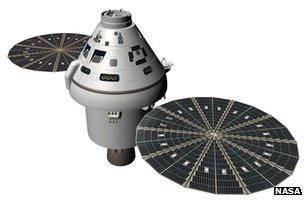European Space Agency defines Ariane and space station plans
- Published

The Ariane 5 will get a more powerful upper-stage engine to increase its satellite carrying capacity
European Space Agency (Esa) member states have resolved key issues at their ministerial council and agreed a 10.1bn-euro programme of activities.
The big decisions included a go-ahead for an upgrade on Europe's Ariane 5 rocket in parallel with design work on a replacement for the early 2020s.
Esa nations also approved the project to provide the propulsion unit for Nasa's new manned capsule, Orion.
In the surprise of the meeting, even the UK put money into this project.
It has long stayed out of the agency's human spaceflight activities, but agreed to a "one-off, 20m-euro" contribution because of the technology development it could enable in a number of British companies.
"We're confident our interests will be reflected," UK science minister David Willetts said.
Most of the meeting's agenda had been worked out in advance. Great uncertainty however had remained over how much the 20 nations could commit to space in the midst of the Eurocrisis.
With that context in mind, Esa director-general Jean Jacques Dordain expressed great satisfaction at the 10.1bn-euro (£8.1bn; $12.9bn) outcome.
"Member states recognize that space is not an expense; it's an investment," he said.
'Historic moment'
The future of Ariane 5 and how to maintain its competitiveness in the face of growing international competition was the most problematic topic going into the Ministerial Council.
Jean-Jacques Dordain: "Space is investments; it's no longer expenses"
Germany had wanted to upgrade the rocket with a more powerful upper-stage engine to make it more versatile and therefore more attractive to potential customers; the French had wanted to go straight to a next-generation launcher that would benefit from substantially reduced production costs.
In that argument, Germany won. Ariane 5ME (Mid-Life Evolution) will be developed and will aim to fly in 2017.
However, the upper-stage Vinci engine will also be used on the successor (now officially called Ariane 6), and the meeting appeased French concerns by agreeing to detailed definition studies now and another gathering in 2014 to decide how to implement the future vehicle.
The hope is it can be put on the launch pad by about 2021.
Settling the launcher issue enabled a cascade of other agreements.
On the International Space Station (ISS), ministers not only had to find money to cover general European operating costs, they also had to approve their non-cash contribution to the orbiting platform.
Prof Jan Woerner: A successful meeting for Europe and Germany
There is a gap in this obligation in the period 2017-2020 and the US space agency (Nasa) had asked Esa to fulfill it by making a propulsion unit that could drive the Americans' new manned capsule, Orion, through space.
European member states indicated they would do this - but there was a surprise: the UK said it would help with the cost, which is expected to be 450m euros.
Even though it was an original signatory on the treaty that brought the ISS into being, Britain has steadfastly refused down the years to pick up any of the costs of constructing the platform or even to pay for the UK national Tim Peake, who was recently selected as an astronaut.
But Mr Willetts indicated his nation would make a "one-off, 20m-euro" contribution to the propulsion module project. He said there were telecommunications and propulsion companies in Britain that would benefit from the involvement.

America's Orion manned capsule needs a propulsion unit to push it through space
Mr Dordain's reaction: "The UK is on the space station. It's a historic moment."
Professor Jan Woerner, part of Germany's delegation in Naples and a frequent critic of Britain's past reluctance to join the ISS programme, also saluted the change of position.
In addition, he highlighted the significance of the module to Europe more widely.
"The first flight is an unmanned flight, but Orion, as you know, is a capsule for future human transportation so it's a big deal that Esa is now on the critical path together with the Americans for human transportation."
After the two-day event, Germany went away as the largest Esa contributor (2.6bn euros) followed by France (2.3bn). The pair are the traditional power-houses in European space. But the meeting saw the UK climb (1.5bn) above Italy (1.1bn) into third position. The monies agreed in Naples will be spent over different periods but, broadly speaking, over the next three to five years.
Esa's science budget - the part that makes space telescopes to study the cosmos, and the like - received a "flat cash" settlement of 2.5bn euros. In other words, the 2013 budget will be repeated in the following four years with no adjustment for inflation (ie 508m per year).
Science is the agency's mandatory programme. Everyone must contribute a sum that reflects the relative size of their economy.
Jonathan.Amos-INTERNET@bbc.co.uk and follow me on Twitter: @BBCAmos, external
- Published21 November 2012
- Published20 November 2012
- Published20 November 2012
- Published19 November 2012